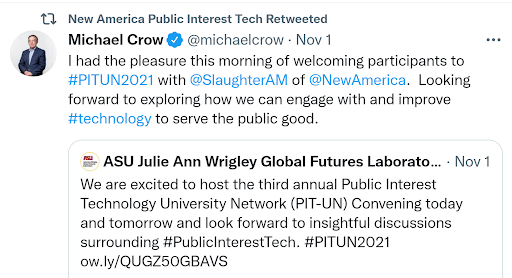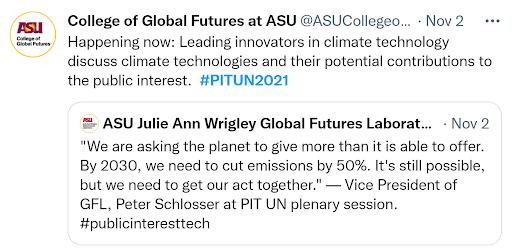Highlights from the 2021 PIT-UN Convening
The third annual Public Interest University Network (PIT-UN) convening took place virtually on Nov. 1 and 2. The event was organized and hosted by Arizona State University, and brought together Network members, PIT practitioners, students and advocates.
Relive the event if you already attended, or learn about the hot-button issues surrounding the field. You’ll hear what experts think will galvanize non-academic stakeholders to get behind the promise of PIT, and how the field is unfolding with each new PIT course, cohort, project, student club, and new PIT-UN member.

Climate Tech: PIT or Pitfall?
Two crucial conclusions can be reached from the recent IPCC Climate Change 2021 report:
1) Climate technologies will be crucially important in ongoing efforts to moderate climate change
2) Climate technologies will not be sufficient in such efforts
This discussion explores both climate technologies and their potential contributions to the public interest from the perspectives of leading innovators in climate technology, as well as leading thinkers in the governance of such technologies. By bringing such groups together, the hope is to bring a new technological dimension to the PIT community, as well as draw insights from PIT to apply to climate tech.
Speakers:
- Laura Helmuth (Moderator) Scientific American, Editor in Chief
- Klaus Lackner, Arizona State University, Director of Center for Negative Carbon Emissions
- Sikina Jinnah, UC Santa Cruz, Associate Professor
- Holly Buck, University at Buffalo in Buffalo, New York, Assistant Professor of Environment and Sustainability
- Matthew Wallenstein, Colorado State, Professor
- Jasmine Sanders, Our Climate, Executive Director
- Janene Yazzie, Sixth World Solutions, Director

2021 Network Challenge Grantee Reveal
On November 2, 2021, New America announced the third annual Public Interest Technology University Network (PIT-UN) Network Challenge grantees. The Challenge awarded $3.61 million to 31 grantees to fund and support critical research, field building, and the development of a burgeoning career pipeline for public interest technologists that began in 2019 when the Network was established.
The network and challenge grants are funded through the support of the Ford Foundation, Hewlett Foundation, Mastercard Impact Fund, with support from the Mastercard Center for Inclusive Growth, The Raikes Foundation, Schmidt Futures and The Siegel Family Endowment.
Read about the 31 projects in the 2021 Network Challenge Grantee special feature.
PIT-UN Member Meetings and Networking
Over the course of two days, PIT-UN members came together for closed-door special sessions to discuss issues ranging from PIT pedagogy to the relationship between PIT and justice, equity, diversity and inclusion (JEDI) activities to PIT and global inequities, and working with for-profit and not-for-profit organizations around PIT.
Additionally, several members presented the following projects through a poster session and took part in a hands-on cooking demonstration and conversation with chef Pietro Vitelli to explore different, delicious ways that food is a public interest technology.
2020 PIT-UN Grantee Project Presentations
- Ashley Rockwell,Georgia State University Library: Public Interest Data Literacy (PIDLit)
- Katie Cumiskey, College of Staten Island St. George/City University of New York: Supporting public interest technologists with intentional learning communities
- Kurtis Heimerl, Madrona Venture Labs: Enabling Small-Scale Cooperative Cellular Networks for Distributed Internet
- Dave Guston, Arizona State University: PIT-UN Challenge: Toward the Comprehensive PIT Institution
- Carlos Genatios, Miami Dade College: Geographic Information Systems for Environment and Community, Phase 2
- Christie Taylor and Jon Goodall, University of Virginia: A Community Fellows Program for Public Interest Technology
- Erhardt Graeff, Olin College: Public Interest Technology Clinic Summer Fellowship Program
- Ken Fleischmann,The University of Texas at Austin: The PIT-UN Social Justice Informatics Faculty Fellows Program
- Chris Goranson, Carnegie Mellon University – Heinz College: The Policy Innovation Lab
- Jeremy Johnson, UC, Berkeley: Algorithmic Justice at UC-Berkeley: Cultivating PIT Scholars and Career Pathways
- Michael Bernstein, Stanford University: Developing An Ethics Review Board for Artificial Intelligence Research
- Tayo Fabusuyi and Raymar Hampshire, University of Michigan: Strengthening PIT Career Pathways for Persons of Color: A Knowledge Network and Experiential Learning Approach
- Tian Zheng and Jennifer Laird: Columbia-Lehman Public Interest Technology Data Science Corps (PIT-DSC)
- Brooke Williams, Boston University: Justice Media Collective
